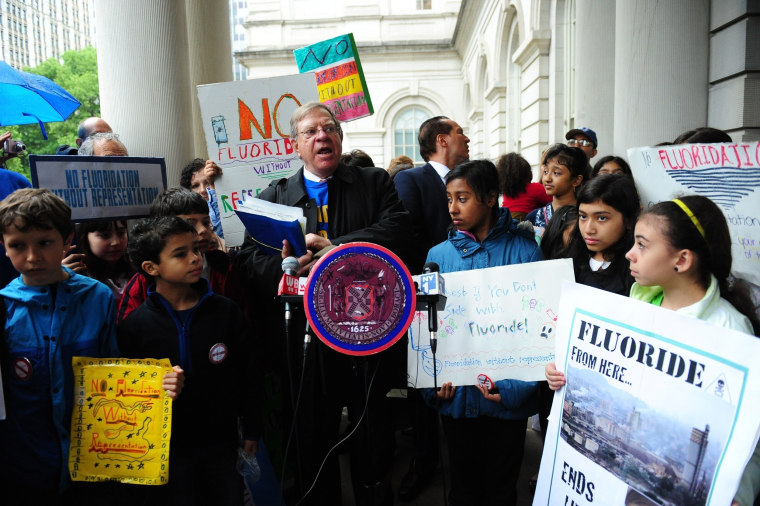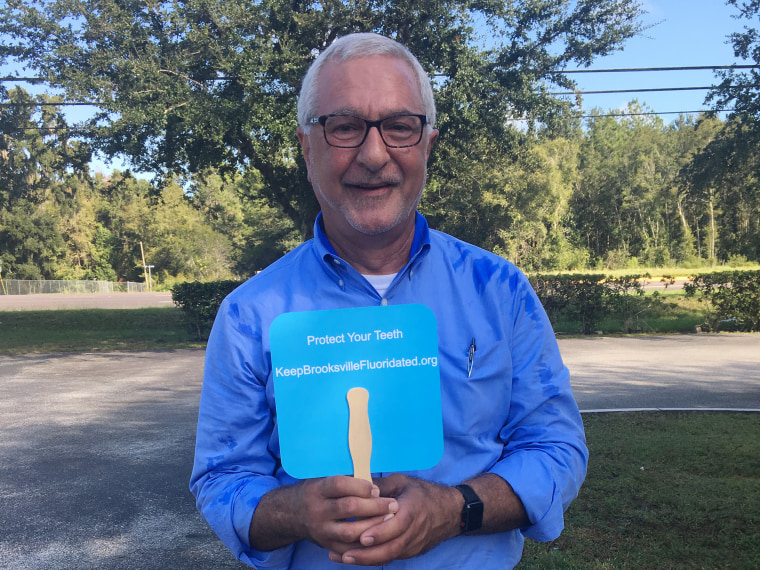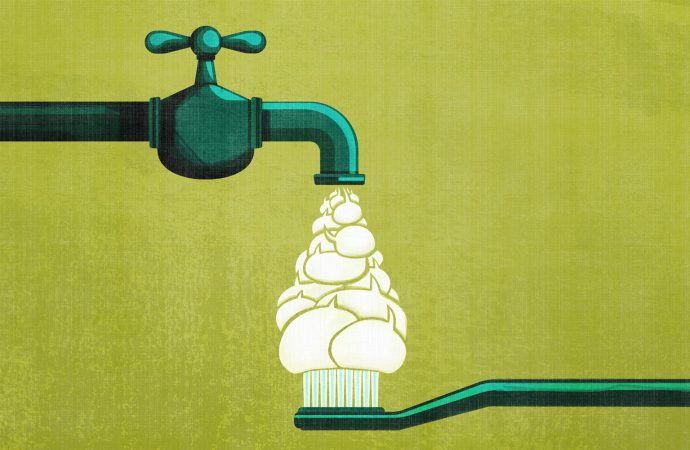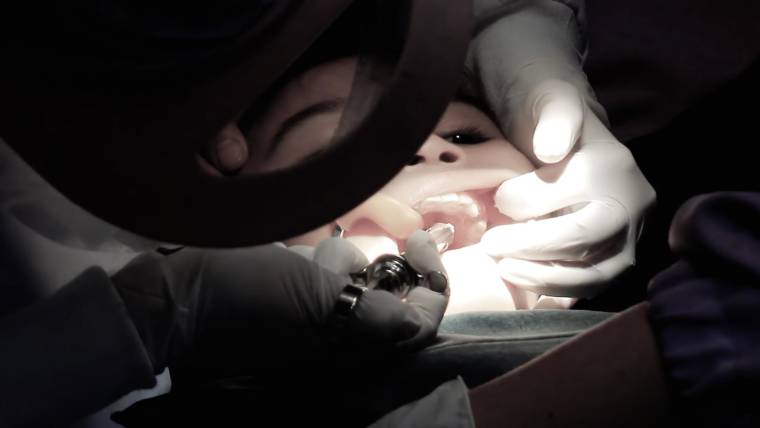In the past five years, 74 cities have voted to remove fluoride from their drinking water, despite thousands of studies showing it prevents cavities.
It has been hailed by the Centers for Disease Control and Prevention as one of the top public health achievements of the 20th century. Numerous studies have proven its safety and efficacy. But fluoride — the naturally occurring compound that prevents cavities and tooth decay — is still sparking heated debates, seven decades after it was first added to America’s water supply.
“Anti-fluoridationists” — a small but vocal minority — are disputing long-established science to say that fluoride added to tap water lowers IQ and causes everything from acne to anemia to Alzheimer’s.
These anti-fluoride believers are active online but also at the polls: In the past five years, 74 cities have voted to remove fluoride from their drinking water, according to the American Dental Association. This year, there have been 13 votes around the country on fluoridation, and at least three more cities have fluoride referendums on the ballot in November: proposed bans in Brooksville, Florida, and Houston, Missouri, and a vote on bringing fluoridated water back in Springfield, Ohio.
The frets over fluoride are reminiscent of the unfounded fear that vaccines cause autism: disproved by science, yet steadfast nonetheless. The persistence of fluoride conspiracy theories — which emerged in the 1950s with claims that fluoridation was a communist plot to dumb down Americans — is alarming public health officials, including the American Dental Association and the American Academy of Pediatrics, who say fluoride is a safe, inexpensive way to boost children’s oral health.
Dr. Johnny Johnson, a retired pediatric dentist who is president of the nonprofit American Fluoridation Society, calls the anti-fluoride efforts “cult-like.”
“You cannot tailor public health to the whims of a small group of people,” he said. “If you are doing that, you are harming a large group of people.”
The anti-fluoridationists, though, say that it’s the fluoride supporters who are harming the public’s health. Some argue that the government uses fluoride as a form of mind control; others believe it’s designed to boost the sugar lobby by enabling people to eat more sweets without getting cavities; and still others believe that health officials are afraid to reverse course on fluoride after promoting it for decades.

They spread the word on Facebook groups, like that of the New York State Coalition Opposed to Fluoridation, which blames fluoride for problems including thyroid damage and was slammed in 2012 for falsely claiming that the federal government “recommends avoiding fluoridated water when making infant formula.” (The CDC says it’s fine to use fluoridated tap water for formula, though the agency notes it may cause mild spotting on babies’ teeth, so parents can use low-fluoride bottled water some of the time instead.) Reddit users claim fluoride kills gut bacteria. And on Twitter, fluoride is regularly called a cancer-causing neurotoxin.
The anti-fluoride movement has also made headway offline. In June, the Texas Republican Party opposed water fluoridation in its 2018 platform. In New Jersey, where more than 80 percent of residents do not have fluoridated water, the town of East Brunswick stopped fluoridating three years ago after Mayor David Stahl called it “mass medication of the public,” a familiar refrain on anti-fluoridation forums. In Brooksville, Florida, a city of 8,000 about an hour north of Tampa, Mayor Betty Erhard has said for years that fluoride is a toxin and a waste of taxpayer money. Next month, at her urging, Brooksville will vote on removing it.

“I believe that people should consent to what’s in their water,” Erhard said. Some townspeople agree.
“Fluoride is a dangerous cancer-causing agent. I don’t even like taking a shower in it,” one wrote on Erhard’s Facebook page.
CONTROVERSY FROM THE VERY START
The first place in America to receive fluoridated water was Grand Rapids, Michigan, in 1945, when residents there became guinea pigs for the theory that boosting existing natural fluoride levels in water would decrease tooth decay, particularly in children. The experiment, by the United States Public Health Service, was done without residents’ consent — still a point of contention among anti-fluoridationists.
The experiment was so successful that 11 years into what was supposed to be a 15-year study, researchers announced the rate of cavities among Grand Rapids’ 30,000 schoolchildren had dropped by 60 percent. But not everyone was pleased.
“I was called a murderer and a communist,” Dr. Winston Prothro, director of public health in Grand Rapids during the early days of fluoridation, told The Washington Post in 1988. “I must have had letters from every city in America, and plenty from other countries, too. It fell on me to defend the physical and moral health of our entire city.”
Treating dental care as an afterthought has dangerous consequences
Since then, the conspiracy theories have evolved from fears of a communist plot to other worries about purported dangers of fluoride — an abundant element that occurs naturally in water, even when it’s not added by the government.
“Now, you have this weird backlash where people think that anything that is a chemical is bad, even though everything is a chemical,” said University of Miami associate professor Joseph Uscinski, co-author of the book “American Conspiracy Theories.” “There are groups of people who think that if something isn’t natural, it is somehow impure or bad, and it grosses them out.”
To experts, objecting to fluoride is nonsensical. The compound, consumed in water or applied topically through toothpaste or mouthwash, prevents cavities by replacing weakened structures in the teeth, said Dr. Kerry Maguire, associate clinical investigator of Forsyth, an independent research institute specializing in oral health.
It’s true that too much fluoride can be dangerous — one complication is skeletal fluorosis, which causes stiffening and pain of the joints and bones or abdominal pain, nausea and vomiting — but those effects only occur with prolonged exposure to a far higher level of fluoride than is found in public water systems in the U.S., experts say. In this country, the only common side effect of fluoridation is fluorosis of the teeth — minor staining that is often only visible to a dentist.
THE ANTI-FLUORIDE MOVEMENT
Today, nearly 75 percent of the U.S. receives fluoridated water from community water systems.
That’s a number that Paul Connett, a chemistry professor emeritus at St. Lawrence University in Canton, New York, hopes to get down to zero.
“There’s umpteen ways that fluoride can cause damage,” said Connett, executive director of the nonprofit Fluoride Action Network, which aims to end fluoridation worldwide.
Connett was initially skeptical of concerns about fluoride when his wife asked him two decades ago about its health effects.
“The prevailing attitude is that people who are opposed to fluoride are crazy, so I didn’t want to be stigmatized in that way,” Connett said.

































1 Comment
nyscof
November 2, 2018, 7:52 amA well-done article draws complaints from both sides of an issue covered. But fluoridation proponents are enthralled by this one which seems to be influenced (or partially written) by the fluoridation lobby’s PR company. It is a one-sided slanderous propaganda piece that is misguided and, too often, just plain wrong.
Conspiracy theory attackers – hold your fire. This email exchange on twitter raises serious concerns.
(Protagonists in this story: Johnny Johnson is the President of a fluoridation advocacy group
Liz Shawen is a PR representative of the Moore Agency which counts the Florida Dental Association as one of its clients. @echuckles is the twitter account of Elizabeth Chuck who, without a science background, "wrote" the NBC News fluoridation article.)
Liz Shawen @LizShawen Oct 17
Liz Shawen Retweeted NBC News
Great reporting by @echuckles on Brooksville FL fluoridation vote, the evidence backing the safety/efficacy of fluoridation, & the controversy that still surrounds it in spite of this. Love working w/ passionate advocate and expert @drjohnnyjohnson!
Johnny Johnson @drjohnnyjohnson Oct 19 This story by @echuckles has been a real honor to work on with
you, @LizShawen Having someone that knows their stuff and how to let others express themselves in an appropriate manner
is a true gift. You’ve got that!! Thank you!
Over 300 studies 50+ human show that fluoride causes neurological damage. Even the EPA admits it is so. However, the NBC writer decided that one poorly done study (National Toxicology Program – NTP) was enough to "prove" fluoridation is safe. She oddly used the samescientifically inaccurate argument the fluoridationists use
Nonetheless, the NTP study has already been debunked in Medical Hypotheses (December 2018) The authors identify ten major flaws in the NTP experiment, for example, they used fluoride-resistant rats.
Further, Brenda Staudenmaier further debunks the article in her video rebuttal here: https://www.youtube.com/watch?v=DE5ekdn96G4 (For example, the NBC writer erroneously said fluoride toxicity studies are not published in peer-reviewed journals – but they are)
Continued: http://www.FluorideDangers.Blogspot.com
REPLY